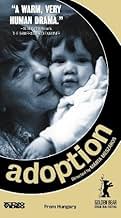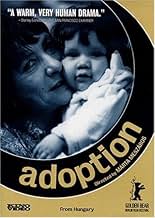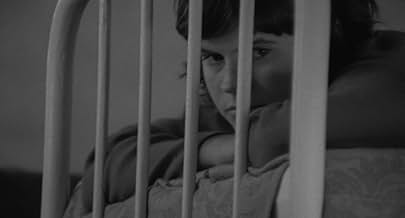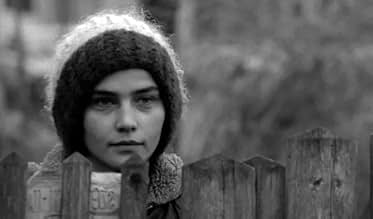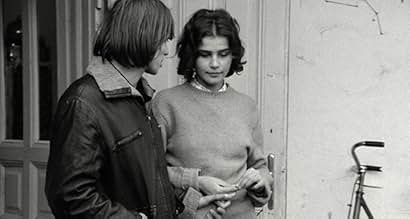ÉVALUATION IMDb
7,2/10
1,6 k
MA NOTE
Ajouter une intrigue dans votre langueA lonely middle-aged woman wants to give birth to a child, but her acquaintance with dysfunctional teenagers leads her to the idea of adoption.A lonely middle-aged woman wants to give birth to a child, but her acquaintance with dysfunctional teenagers leads her to the idea of adoption.A lonely middle-aged woman wants to give birth to a child, but her acquaintance with dysfunctional teenagers leads her to the idea of adoption.
- Director
- Writers
- Stars
- Prix
- 4 victoires et 1 nomination au total
Katalin Berek
- Csentesné - Kata
- (as Berek Kati)
János Boros
- Anna apja
- (as Boross János)
Árpád Perlaky
- Orvos
- (as Dr. Perlaky Árpád)
Avis en vedette
Beautiful black and white cinematography full of close-ups and the depiction of faces, details and of factory workers. Good acting depicting a sudden relationshipt that arises and develops between an unmarried woman who wants a baby (and her married boyfriend does not) and a teenager who has been abandoned by her parents and wants to marry her boyfriend. By helping and listening the latter, the former understands better her own situation and makes decisive decisions. I am not entirely convinced about the development of any of these two characters, and the so much mentioned troubled life of the girl and the labour condition of the woman seem not to seriously influence their attitude along the story. Script perhaps does not show enough coherence (the slap being the most gratuitous moment, perhaps) despite the slow time dedicated to dialogues.
A single woman turned 40 wants a baby but has nobody to give her one. Her instincts displaced, she befriends a tearaway girl from a young offender's institution. The two women, each at a watershed in their lives, draw something from each other without being able to relate to each other properly.
It has an ungainly, unstructured feel to it more sentiment than substance - like a day imperfectly remembered, which amounts to a startling, artless realism. The smudgy black and white Hungarian landscape and sparse dialogue are forefunners of Tarr's, and there are some nicely observed characters. Women will connect with Meszaros' worldview: life as a forlorn struggle to be as benign as one might want to be, but inevitably held back by the sheer dourness of the world. So we make do with what we have and hope that things occasionally work out, as they do here. Winner of the Golden Bear.
It has an ungainly, unstructured feel to it more sentiment than substance - like a day imperfectly remembered, which amounts to a startling, artless realism. The smudgy black and white Hungarian landscape and sparse dialogue are forefunners of Tarr's, and there are some nicely observed characters. Women will connect with Meszaros' worldview: life as a forlorn struggle to be as benign as one might want to be, but inevitably held back by the sheer dourness of the world. So we make do with what we have and hope that things occasionally work out, as they do here. Winner of the Golden Bear.
One of the great films about women made by a woman, Marta Meszaros' "Adoption" is about the most fundamental need of many women, to be a mother. Kata is a 43 year old widow, living alone but having an affair with a married man who is not prepared to leave his wife. One day she asks him to father a child with her, which she will raise alone, but he refuses. Then she meets Anna, a young girl from the local boarding school, who asks Kata if she can use her house to meet her boyfriend. A friendship develops between them that might lead to all their problems being solved.
Meszaros shoots her film mostly in close-ups as if by focusing on these faces we are also getting inside their heads. It's an unusual treatment of an unusual subject, one that in an American film would have been sentimentalised out of all proportion. As Kata, Katalin Berek is extraordinarily good and the director, one-time wife of Miklos Jansco, never deviates from the intensity of her subject, making this a deeply moving film. Not much seen these days, this remains a key film of the seventies.
Meszaros shoots her film mostly in close-ups as if by focusing on these faces we are also getting inside their heads. It's an unusual treatment of an unusual subject, one that in an American film would have been sentimentalised out of all proportion. As Kata, Katalin Berek is extraordinarily good and the director, one-time wife of Miklos Jansco, never deviates from the intensity of her subject, making this a deeply moving film. Not much seen these days, this remains a key film of the seventies.
Based on the first 30 min, which was all I could take, this film, consisting mostly of chain smoking Hungarians earnestly and humorlessly conversing about motherhood and adoption, seems designed to repel viewers. C minus.
Marta Meszaros was born in 1931 and still making films having made about thirty and shorts and TV also previously married to Miklos Jancso. Mostly known for Diary For My Children (1984) and recently Aurora Borealis: Northern Light (2017) and Adoption made earlier with an award at Berlin. The film is rather sad with the woman in her 40s and really wanting to have a baby but her lover not happy as he already has a wife and children. A young dysfunctional girl, she thinks, it might be an idea, although it is rather silly and it becomes complicated she is already unhappy with her life and her parents. The end is very sudden as she runs for a bus, although it doesn't look like being a good outcome. Nevertheless I thought it was well done and especially of the young girl and the older woman, and of course everyone at the wedding.
Le saviez-vous
- AnecdotesIncluded in the Criterion Collection, Spine #1115.
- ConnexionsFeatured in Women Make Film: A New Road Movie Through Cinema (2018)
Meilleurs choix
Connectez-vous pour évaluer et surveiller les recommandations personnalisées
- How long is Adoption?Propulsé par Alexa
Détails
- Durée1 heure 29 minutes
- Couleur
- Mixage
- Rapport de forme
- 1.85 : 1
Contribuer à cette page
Suggérer une modification ou ajouter du contenu manquant

Lacune principale
By what name was Örökbefogadás (1975) officially released in Canada in English?
Répondre

